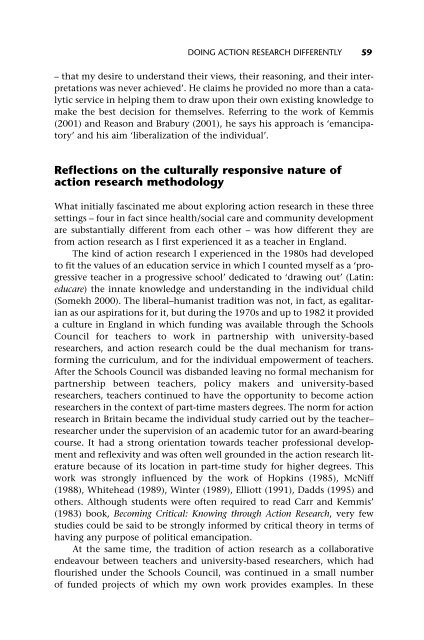Action Research A Methodology for Change and Development
Action Research A Methodology for Change and Development
Action Research A Methodology for Change and Development
Create successful ePaper yourself
Turn your PDF publications into a flip-book with our unique Google optimized e-Paper software.
DOING ACTION RESEARCH DIFFERENTLY 59<br />
– that my desire to underst<strong>and</strong> their views, their reasoning, <strong>and</strong> their interpretations<br />
was never achieved’. He claims he provided no more than a catalytic<br />
service in helping them to draw upon their own existing knowledge to<br />
make the best decision <strong>for</strong> themselves. Referring to the work of Kemmis<br />
(2001) <strong>and</strong> Reason <strong>and</strong> Brabury (2001), he says his approach is ‘emancipatory’<br />
<strong>and</strong> his aim ‘liberalization of the individual’.<br />
Reflections on the culturally responsive nature of<br />
action research methodology<br />
What initially fascinated me about exploring action research in these three<br />
settings – four in fact since health/social care <strong>and</strong> community development<br />
are substantially different from each other – was how different they are<br />
from action research as I first experienced it as a teacher in Engl<strong>and</strong>.<br />
The kind of action research I experienced in the 1980s had developed<br />
to fit the values of an education service in which I counted myself as a ‘progressive<br />
teacher in a progressive school’ dedicated to ‘drawing out’ (Latin:<br />
educare) the innate knowledge <strong>and</strong> underst<strong>and</strong>ing in the individual child<br />
(Somekh 2000). The liberal–humanist tradition was not, in fact, as egalitarian<br />
as our aspirations <strong>for</strong> it, but during the 1970s <strong>and</strong> up to 1982 it provided<br />
a culture in Engl<strong>and</strong> in which funding was available through the Schools<br />
Council <strong>for</strong> teachers to work in partnership with university-based<br />
researchers, <strong>and</strong> action research could be the dual mechanism <strong>for</strong> trans<strong>for</strong>ming<br />
the curriculum, <strong>and</strong> <strong>for</strong> the individual empowerment of teachers.<br />
After the Schools Council was disb<strong>and</strong>ed leaving no <strong>for</strong>mal mechanism <strong>for</strong><br />
partnership between teachers, policy makers <strong>and</strong> university-based<br />
researchers, teachers continued to have the opportunity to become action<br />
researchers in the context of part-time masters degrees. The norm <strong>for</strong> action<br />
research in Britain became the individual study carried out by the teacher–<br />
researcher under the supervision of an academic tutor <strong>for</strong> an award-bearing<br />
course. It had a strong orientation towards teacher professional development<br />
<strong>and</strong> reflexivity <strong>and</strong> was often well grounded in the action research literature<br />
because of its location in part-time study <strong>for</strong> higher degrees. This<br />
work was strongly influenced by the work of Hopkins (1985), McNiff<br />
(1988), Whitehead (1989), Winter (1989), Elliott (1991), Dadds (1995) <strong>and</strong><br />
others. Although students were often required to read Carr <strong>and</strong> Kemmis’<br />
(1983) book, Becoming Critical: Knowing through <strong>Action</strong> <strong>Research</strong>, very few<br />
studies could be said to be strongly in<strong>for</strong>med by critical theory in terms of<br />
having any purpose of political emancipation.<br />
At the same time, the tradition of action research as a collaborative<br />
endeavour between teachers <strong>and</strong> university-based researchers, which had<br />
flourished under the Schools Council, was continued in a small number<br />
of funded projects of which my own work provides examples. In these

















